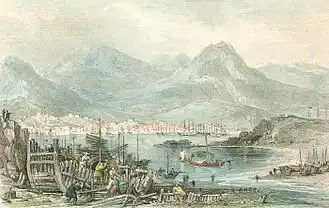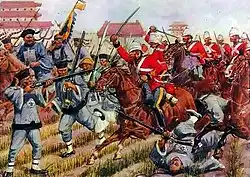
British Chinese surnames are surnames held by people of Chinese heritage born in or living in the United Kingdom. Contacts between Britain and China were very limited prior to the First Opium War fought between the British and Qing Dynasty China between 1839 and 1842, as China had moved to restrict western interference in its lands in the seventeenth century. The First Opium War ended in Britain securing control over Hong Kong and the Second Opium War (1856–1860) extended British influence in the country and cultural interaction. Several hundred Chinese people began settling in London and other parts of Britain as a result in the second half of the nineteenth century. The number continued to grow into the twentieth century. Today the British Chinese community has expanded to approximately half a million as a result of more direct business contacts between Britain and China in modern times and the considerable increase in the number of Chinese students studying in the UK. The British Chinese hold very common surnames like Wong, Wang, Chan, Lee, Liu, Cheng, Tang and Ho.[1]
History of British Chinese surnamesHistory of British Chinese surnames
There have been indirect links between China and most parts of Europe for thousands of years, as trade routes running by land and sea from the Far East to the Mediterranean existed as far back as the second millennium BC. The Roman Empire traded extensively with China (albeit often through intermediaries in Central Asia and India) and this brought Chinese silk and other goods all the way to Roman Britain. These limited, and often indirect, contacts between Britain and China continued through medieval times. It was only in the seventeenth century, following the Portuguese discovery of the sea route around Africa to Asia in the 1490s and the establishment of the English East India Company in 1600 that direct contacts between Britain and China commenced.[2]

The England-China trade in the eighteenth century focused on goods like porcelain and silk that the English wanted from China. Conversely, the British had little to offer that the Chinese wanted other than gold and silver. Therefore they began pressing the Chinese to purchase more and more opium being produced in British India to try and balance the trade deficit. This eventually resulted in the outbreak of the First Opium War in 1839. When it ended three years later the British were in control of the island of Hong Kong and began developing one of the most important colonies of their vast empire here.[3] The British and wider western presence in China was expanded through the Second Opium War (1856–1860).[4] Hong Kong would remain under British rule until 1997 when the UK agreed to hand it over to China as part of the ‘One Country, Two Systems’ transfer of power, whereby a more western-style of democratic government was supposed to remain in place in Hong Kong for fifty years down to 2047.[5]
As soon as England/Britain began trading with China in the seventeenth century there were Chinese people arriving to Britain. The first recorded Chinese visitor to Britain was Shen Fu Tsong, a Chinese Jesuit who arrived to Britain in 1686. A century later, William Macao became the first Chinese person permanently resident in Britain when he settled in Scotland.[6] Several hundred Chinese people began settling in London in the second half of the nineteenth century as part of the growing commercial and political ties between China and Britain. This number increased into the thousands in the early twentieth century.
The British Chinese community has really swelled over the last fifty years as China has re-emerged as a global superpower with economic and commercial concerns all over the world. Tens of thousands of Chinese students also study in British universities and some end up working and living in the UK long term. Finally, the premature dismantling of the ‘One Country, Two Systems’ arrangement in Hong Kong since the introduction of a highly controversial National Security Law in 2020 has seen between 150,000 and 200,000 Hong Kongers seeking asylum in Britain in recent years. As a result, the British Chinese community has swelled to over half a million and there has been a profusion of British Chinese surnames in the UK.[7]
British Chinese naming conventionsBritish Chinese naming conventions
British Chinese surname conventions mimic those of China itself. The first Chinese surnames came into use as far back as the era of the Zhou Dynasty some 3,000 years ago. These were initially used by royals and nobles to indicate lines of aristocratic descent. They then entered more widespread usage in the first millennium BC during the Warring States Period and the era of the Qin Dynasty. Chinese surname practices mirror those found elsewhere in that a proportion are patronymic names used to indicate a royal or aristocratic line of descent, others are occupational, and others are topographical. Hence a Chinese surname like Ji means ‘royal librarian’, while Wang is the Chinese word for ‘king’ and denotes royal lineage.[8]

An important element of Chinese surname practices is that the surname appears before the personal name. This is the direct opposite of western surname conventions where the personal name appears before the surname. As a result, to take a prominent Chinese example, the personal name of the modern-day leader of the People’s Republic of China, Xi Jinping, is Jinping. His surname is Xi. A different situation has developed within the British Chinese community to conform to local surname conventions. Often British Chinese people reverse their names to adhere to western standards, while in the case of second and third-generation British Chinese people, they will often have a western-style personal name followed by a Chinese surname. Hence, the British actress Gemma Chan has a western-style personal name, Gemma, and the surname, Chan, follows after the personal name.[9]
Common British Chinese surnamesCommon British Chinese surnames
The following are some of the most common British Chinese surnames. They mirror the most common surnames in China:
- Li – Li or the Romanized Lee is the most common British Chinese surname. It is amongst the oldest and most common Chinese surnames, held by upwards of 100 million people in China itself.
- Wang – This is the Chinese word for ‘king’. It is, along with Li, the most common surname in China and the second most common British Chinese surname.
- Zhang – Thousands of British Chinese people bear this surname. It means something akin to ‘to open up’ or ‘widening bow’. A Chinese legend holds that the name was originally bestowed on a grandson of the Yellow Emperor, a mythical quasi-religious ruler of ancient China who it was said had invented the bow and arrow.[10]
- Chen – Chen is a very common British Chinese surname. It is often Romanized as Chan. This surname is also common in the People’s Republic in Taiwan and Singapore, so not all people in Britain holding the Chen or Chan surname are necessarily from mainland China or have a Chinese mainland ancestor.
Famous people with British Chinese surnamesFamous people with British Chinese surnames
The following are some famous British Chinese people with common British Chinese surnames:
- Gemma Chan – A British Chinese actress known for starring in the television series Humans and the film Crazy Rich Asians. Her father hailed from Hong Kong.[11]
- Gok Wan – A British Chinese fashion consultant, television presenter and personality. His father, John Wan, came to Britain from Hong Kong.[12]
- Alan Mak – A British Chinese politician who has been the Conservative Party MP (Member of Parliament) for the constituency of Havant since 2015. He is the first MP of East Asian heritage ever in British political history. Mak’s parents came from Guangdong via Hong Kong.[13]
- Katie Leung – A British Chinese actress born in Scotland. She appeared in the Harry Potter series of films. Her parents also came to Britain from Hong Kong.[14]
See alsoSee also
Explore more about British Chinese surnamesExplore more about British Chinese surnames
- United Kingdom, Naturalisation Certificates and Declarations records collection on MyHeritage
- England & Wales, Birth Index, 1837-2005 records collection on MyHeritage
- England Births and Christenings, 1538-1975 records collection on MyHeritage
- England & Wales, Marriage Index, 1837-2005 records collection on MyHeritage
- England Marriages, 1538-1973 records collection on MyHeritage
- United Kingdom Deaths, 1980-2024 records collection on MyHeritage
- England & Wales, Death Index, 1837-2005 records collection on MyHeritage
- England, Telephone Directories records collection on MyHeritage
- United Kingdom, Names & Stories in Newspapers from OldNews.com records collection on MyHeritage
References
- ↑ https://sacu.org/bbcs
- ↑ https://www.bbc.com/news/world-asia-china-37624943
- ↑ https://www.nam.ac.uk/explore/first-china-war-1839-1842
- ↑ https://www.nam.ac.uk/explore/second-china-war
- ↑ https://www.cfr.org/backgrounder/hong-kong-freedoms-democracy-protests-china-crackdown
- ↑ https://www.rossandcromartyheritage.org/home/black-isle-communities/resolis/resolis-folk/william-macao/
- ↑ https://commonslibrary.parliament.uk/research-briefings/cdp-2024-0129/
- ↑ https://www.newworldencyclopedia.org/entry/Chinese_surname
- ↑ https://taazakhabarnews.com/the-mystery-behind-chinese-names/
- ↑ https://www.mychinaroots.com/surnames/detail?word=%E5%BC%B5
- ↑ https://www.imdb.com/name/nm2110418/
- ↑ https://www.carolhayesmanagement.co.uk/artist/gok-wan
- ↑ https://www.alanmak.org.uk/
- ↑ https://www.imdb.com/name/nm1648520/

